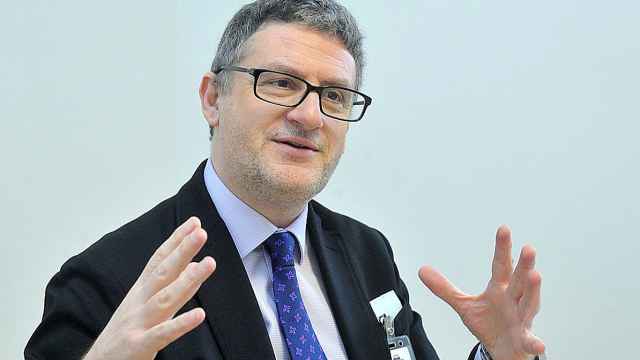The U.S. Embassy in Moscow is dramatically scaling back its cultural exchange programs in Russia after hundreds of diplomats were let go this week.
The Embassy’s Public Affairs department on Aug. 28 announced to staff working on cultural and educational initiatives that it was scaling back from 15 to four employees, several sources close to the embassy told The Moscow Times.
As a consequence, at least three major cultural programs will be scrapped, the sources said.
Russia’s Foreign Ministry in late July ordered the U.S. diplomatic mission to reduce its staff to 455 by Sept. 1 after the U.S. Congress passed new sanctions. Ahead of that deadline on Friday, some 700 Russian Embassy personnel were dismissed, the RBC outlet reported on Wednesday.
The embassy’s department tasked with cultural activities is set to suffer disproportionately from the cuts, losing around two-thirds of its staff, RBC said.
Current embassy employees were hesitant to speak to the Moscow Times, citing the sensitivity of the topic, adding they were unauthorized to comment.
But two former employees with close ties to the current staff and one person who was among those who were dismissed confirmed the reports.
“The entire culture section has been destroyed,” Maria Lvova, who worked at the embassy for years, told The Moscow Times.
A Loud Voice
One of the programs which will be slashed is the American Speakers program, the sources said. Founded in 1993, it was one of the U.S. Mission’s first cultural projects after the Soviet Union’s collapse.
According to Lvova, who coordinated the program between 2004 and January this year when she moved to the U.S. on a green card, about 50 prominent American figures came to Russia each year as part of the program to give lectures and attend events.
“We would invite stars in art and cinema, professors, journalists, scientists and writers,” she told The Moscow Times.
Veteran U.S. diplomat Henry Kissinger, former President George Bush's National Security Advisor Condoleezza Rice and political economist Francis Fukuyama were among some of the most prominent speakers.
The festivals, exhibitions and events were among the embassy’s activities with the largest reach in Russia, attracting thousands of participants, says Lvova.
“When we organized a tour for [U.S. author] Dave Barry, with meetings at universities, schools and public libraries, hundreds of people came to see him,” Lvova recalls.
The program also worked to dispel fears about Russia among those who were visiting.
“Before coming to Russia, we were worried because everyone warned us about tensions between our countries,” Barry told Voice of America about his visit in 2014.
“But we received a very warm welcome. And we got the impression that on a state level there could be complications, but there are no such tensions on a human level.”
Outreach
The cuts also spell trouble for several smaller cultural programs in Russia.
Among the programs to be shuttered is the International Visitor Leadership Program (IVLP), the sources told The Moscow Times.
The program, which launched in Russia in the early 1990s, organizes exchange visits for Russian professionals to the U.S.
“In the good times, the early 90s, groups of up to 12 people would travel to the U.S. every week,” says Lvova, from spheres ranging from education and ecology to the legal system and medicine.
Some of its alumni later became prominent figures in Russian political and social life, including the former Economic Development Minister Alexei Ulyukayev — who is currently under house arrest in an embezzlement case widely seen as political — and Elvira Nabiullina, the head of Russia’s Central Bank.
Cuts have also affected American Spaces, which includes the American Center and the Information Resources Center, Lvova said.
The programs offered access to a comprehensive online library of over 30 commercial and academic databases and organized events related to American culture and society to schools, libraries, universities, and businesses.
Of the original staff of three who worked at the English Language Office, only one person remains, Lvova and another former employee who asked to remain anonymous, said.
The program has worked together with Russian educational institutions since 1993 to promote English-language teaching.
An employee of the Peer-to-Peer Dialogue program, which provides grants for projects Russian-American cooperation, has also been dismissed, Lvova said, adding it was unclear whether or not the program would continue.
In written comments to The Moscow Times, U.S. Embassy spokeswoman Maria Olson declined to “discuss programming specifics or staffing levels.”
“Cultural and educational exchanges, English language and speaker programs, support for film and other festivals, as well as American Center/Spaces outreach will continue,” she said.
The Big Screen
The Embassy’s Speaker Program also supported two film festivals in Russia: the independent film festival AMFEST and Show U.S., for documentary films. The festivals have a wide reach — this year AMFEST will screen in 20 cities throughout Russia.
CoolConnections, the Russian company organizing the two festivals, told The Moscow Times that the festivals are set to go ahead as planned, despite the recent cuts.
“The reductions in the U.S. Embassy staff will not change our plans,” the director of CoolConnections Nadezhda Kotova said.
While the festivals are at risk of losing some U.S. Embassy funding, she was confident they would survive. “Independent American cinema is a great part of contemporary art and will continue to exist despite cuts,” Kotova told The Moscow Times.
Bad Times
The staff cuts mostly affect Russian citizens, who account for roughly 600 dismissals, RBC reported Wednesday.
Out of the 11 people losing their jobs in the U.S.’ cultural departments, only two are American citizens, a Russian employee who was recently dismissed and asked to remain anonymous told The Moscow Times.
Many of them are middle-aged and have worked at the embassy since the 1990s, the source said.
Olson, the U.S. Embassy spokesperson, said that “as a result of the Russian Federation’s order to reduce our staff, dozens and dozens of Americans are leaving Russia.”
“Tragically, hundreds of Russian employees are also losing their jobs — jobs that they have performed in good times and in bad with professionalism, many of them for decades.”
The former employees of the embassy who spoke to The Moscow Times on the condition of anonymity said most Russians who have been dismissed would avoid working for state companies or institutions, fearing backlash after working for the American embassy.
“Russian state organizations prefer not to hire former U.S.Embassy workers and they’ll try to find an excuse not to,” the former embassy worker said.
“They're afraid to let people with such a record in.”
Correction: An earlier version of this text referred to Maria Lvova as the head of the American Speakers program. In fact, she was a coordinator.
A Message from The Moscow Times:
Dear readers,
We are facing unprecedented challenges. Russia's Prosecutor General's Office has designated The Moscow Times as an "undesirable" organization, criminalizing our work and putting our staff at risk of prosecution. This follows our earlier unjust labeling as a "foreign agent."
These actions are direct attempts to silence independent journalism in Russia. The authorities claim our work "discredits the decisions of the Russian leadership." We see things differently: we strive to provide accurate, unbiased reporting on Russia.
We, the journalists of The Moscow Times, refuse to be silenced. But to continue our work, we need your help.
Your support, no matter how small, makes a world of difference. If you can, please support us monthly starting from just $2. It's quick to set up, and every contribution makes a significant impact.
By supporting The Moscow Times, you're defending open, independent journalism in the face of repression. Thank you for standing with us.
Remind me later.






